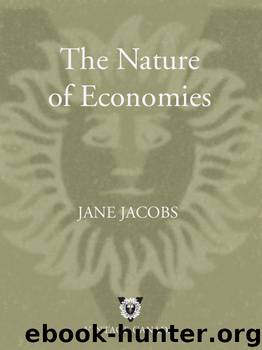The Nature of Economies by Jane Jacobs

Author:Jane Jacobs [Jacobs, Jane]
Language: eng
Format: epub, azw3
ISBN: 978-0-307-36708-2
Publisher: Random House of Canada
Published: 2000-09-05T16:00:00+00:00
Chapter 6
THE DOUBLE NATURE OF FITNESS FOR SURVIVAL
“Now what?” asked Armbruster. “Should we continue without Murray, or should we take a recess?”
“Kate mentioned that she had something to contribute,” said Hortense.
Without waiting for permission or agreement, Kate seized the opening Hortense had given her. “I’ve been thinking about fitness for survival in ecosystems. And do be patient with me, Armbruster, because this is relevant to economic life. Fitness as determined by natural selection means that an organism is successful in competing to feed and breed. It also means that the organism must have traits which prevent it from destroying its own habitat, because an indispensable requirement for the organism is an arena in which to feed, breed, and compete.
“In this light,” she went on, “consider the great cats: If they were so inclined, they could wipe out all their prey, then starve. Yet a gazelle or two at a time is enough for them. I once took a house cat into an abandoned apartment where quite a bit of food had been left. As you would expect, it was overrun with mice. They were even in the refrigerator, and to my amazement, when I looked in the freezer compartment, they were scampering across ice cubes and gnawing frozen foods. When I opened cupboard doors and disturbed them, mice ran about everywhere. Although the cat had been fed and wasn’t hungry, it went for the mice with gusto. However, after catching only three, it goofed off for the rest of the day on a sunny windowsill while I dumped food into garbage bags, swept up, and then set traps.
“The great jungle cats share the same trait as that house cat. Prudence doesn’t restrain them from unremitting killing, as far as we can tell. The check seems to be their disposition to snooze and bask instead of exerting themselves unnecessarily.
“Elephants uproot and trample impressive swaths as they feed and wander. If they were so inclined, they could convert their own habitats to desert—to their own disadvantage. But they’re drawn to other occupations, such as playing in rivers, squirting themselves and each other with water, and milling about sociably on land, evidently finding interest and contentment in each other’s company
“Bonobos, the recently famous primates that are one of our two closest living cousin species, are celebrated—or notorious—for the time and effort they devote to sex play totally unrelated to reproducing. Our other close relatives, the chimpanzees, go in for grooming each other like workaholic nursemaids or demented hairdressers in the ample time they take off from exploiting their habitats. One could go on and on: Otters play on water slides; raccoons gambol and roll about together—evolution has equipped them with things to do other than catching all the fish available or otherwise tearing apart their habitats.”
“Time out from nature red in tooth and claw,” said Armbruster.
“I’ve heard that bluefish kill without letup,” said Hortense. “But of course the ocean is too big to be destroyed by them.”
Hiram looked skeptical. “Those traits you mention may simply enhance competitive natural selection,” he said.
Download
This site does not store any files on its server. We only index and link to content provided by other sites. Please contact the content providers to delete copyright contents if any and email us, we'll remove relevant links or contents immediately.
International Integration of the Brazilian Economy by Elias C. Grivoyannis(109470)
The Radium Girls by Kate Moore(12014)
Turbulence by E. J. Noyes(8040)
Nudge - Improving Decisions about Health, Wealth, and Happiness by Thaler Sunstein(7689)
The Black Swan by Nassim Nicholas Taleb(7105)
Rich Dad Poor Dad by Robert T. Kiyosaki(6603)
Pioneering Portfolio Management by David F. Swensen(6287)
Man-made Catastrophes and Risk Information Concealment by Dmitry Chernov & Didier Sornette(6002)
Zero to One by Peter Thiel(5786)
Secrecy World by Jake Bernstein(4740)
Millionaire: The Philanderer, Gambler, and Duelist Who Invented Modern Finance by Janet Gleeson(4464)
The Age of Surveillance Capitalism by Shoshana Zuboff(4274)
Skin in the Game by Nassim Nicholas Taleb(4235)
The Money Culture by Michael Lewis(4196)
Bullshit Jobs by David Graeber(4179)
Skin in the Game: Hidden Asymmetries in Daily Life by Nassim Nicholas Taleb(3987)
The Dhandho Investor by Mohnish Pabrai(3758)
The Wisdom of Finance by Mihir Desai(3727)
Blockchain Basics by Daniel Drescher(3574)
